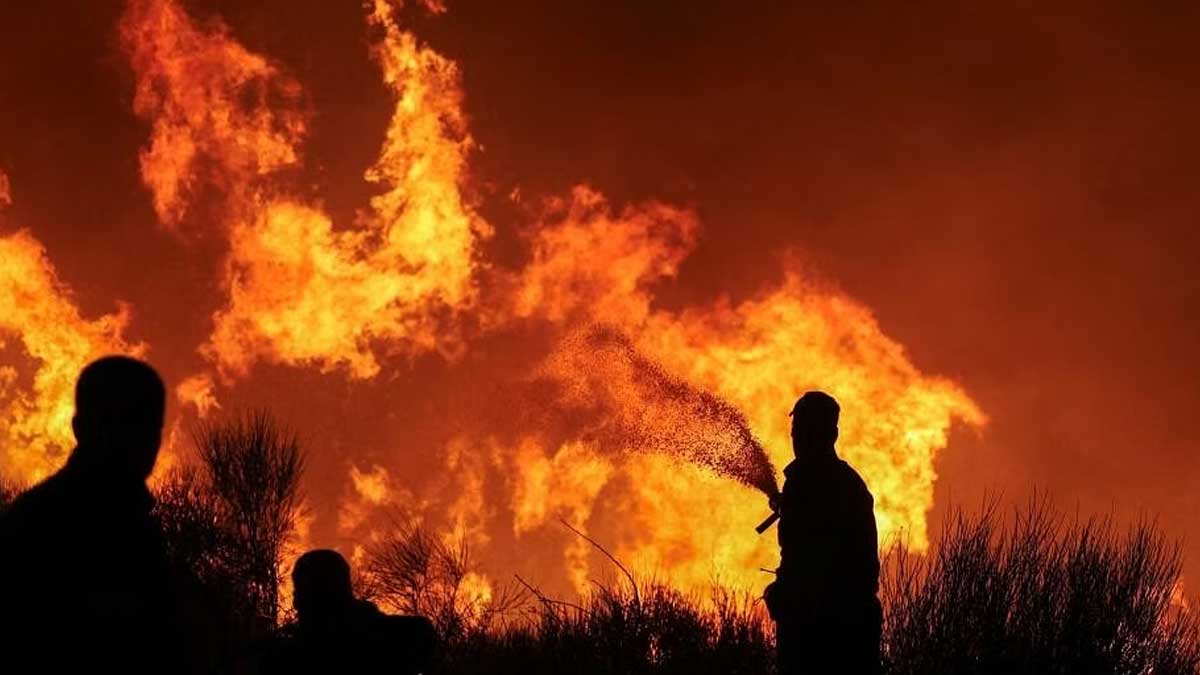- Home
- Billionaires
- Investing Newsletters
- 193CC 1000
- Article Layout 2
- Article Layout 3
- Article Layout 4
- Article Layout 5
- Article Layout 6
- Article Layout 7
- Article Layout 8
- Article Layout 9
- Article Layout 10
- Article Layout 11
- Article Layout 12
- Article Layout 13
- Article Layout 14
- Article Sidebar
- Post Format
- pages
- Archive Layouts
- Post Gallery
- Post Video Background
- Post Review
- Sponsored Post
- Leadership
- Business
- Money
- Small Business
- Innovation
- Shop
Recent Posts
Wildfire Sparks Evacuations Near Athens Amid Record Heat

A massive wildfire has prompted the evacuation of more than a dozen towns and several hospitals in the area north of Athens, Greece, over the past 48 hours. This blaze, deemed the worst in Greece this year, continues to rage despite the concerted efforts of over 650 firefighters, nearly 200 fire engines, and dozens of aerial firefighting teams. The fire, which broke out on Sunday afternoon, has been described as “extremely dangerous” by Vassilis Kikilias, Greece’s Minister of Climate Crisis and Civil Protection. The fire is currently advancing towards Penteli, a village located about 10 miles northeast of Athens, according to reports from CNN.
On Sunday, residents of eight nearby villages were ordered to evacuate, and by Monday, at least five more communities, along with two hospitals, several monasteries, and a children’s home, had been added to the evacuation list. The severity of the situation is underscored by the plumes of smoke visible on the horizon from the Parthenon, a historic site about 500 feet above sea level in Athens. The fire is now approaching this densely populated metropolitan area, home to about 3 million people and a destination for tens of millions of tourists each year.
Numerous citizens and firefighters have sustained injuries or required hospital treatment since the fire began, as reported by NBC News, though fortunately, no fatalities have been reported. Officials have noted that the flames have at times reached heights of over 80 feet, driven by strong winds and exacerbated by the hot, dry conditions. These dangerous weather conditions have led to half of Greece being placed under a “red alert” for fires, with warnings expected to remain in effect until Thursday.
Greece has a long history of battling wildfires, and the current situation brings back memories of previous devastating fires. Last year, wildfires claimed the lives of more than 20 people in the country. In 2018, a massive blaze swept through the town of Mati, killing over 100 people. The aftermath of that disaster led to the conviction of five officials and the property owner where the fire originated on charges of criminal negligence. This latest fire comes on the heels of Greece experiencing its hottest months on record in June and July, creating a perfect storm for a wildfire. Three of the four highest July temperatures in Greece over the last 80 years have occurred within the past four years, with this July being 0.54 degrees Fahrenheit warmer than the previous record.
The escalating frequency and intensity of these fires underscore the growing impact of climate change on Greece. As the country grapples with these extreme weather events, the economic implications are becoming increasingly apparent. Tourism, a crucial sector of Greece’s economy, is affected by these recurring natural disasters. According to the latest data from CEIC, an economic data firm, citing figures from the Bank of Greece, 3.05 million people visited Greece in May. Tourism to Greece has surged in recent years, growing by 120% between 2019 and 2023. A record 36 million tourists visited the country in 2023 alone. However, the ongoing wildfires could have a significant impact on this upward trend. Last fall, in response to concerns about overcrowding and the potential damage to historical sites, Greek tourism officials announced a daily cap of 20,000 visitors to the Athens Acropolis archaeological site, which includes the iconic Parthenon temple.
As Greece confronts another year of extreme temperatures and destructive wildfires, the need for effective climate mitigation and disaster preparedness strategies is more urgent than ever. The current wildfire serves as a stark reminder of the challenges ahead for Greece and other countries facing similar threats. The combination of rising temperatures, prolonged heatwaves, and the increasing occurrence of wildfires presents a daunting challenge for the region. As the fire continues to burn, the focus remains on protecting lives and property while addressing the broader issues of climate change and environmental sustainability contributing to these devastating events.
Recent Posts
Categories
- 193cc Digital Assets2
- 5G1
- Aerospace & Defense46
- AI37
- Arts3
- Banking & Insurance11
- Big Data3
- Billionaires449
- Boats & Planes1
- Business328
- Careers13
- Cars & Bikes76
- CEO Network1
- CFO Network17
- CHRO Network1
- CIO Network1
- Cloud10
- CMO Network18
- Commercial Real Estate7
- Consultant1
- Consumer Tech180
- CxO1
- Cybersecurity68
- Dining1
- Diversity, Equity & Inclusion4
- Education7
- Energy8
- Enterprise Tech29
- Events11
- Fintech1
- Food & Drink2
- Franchises1
- Freelance1
- Future Of Work2
- Games141
- GIG1
- Healthcare78
- Hollywood & Entertainment186
- Houses1
- Innovation42
- Investing2
- Investing Newsletters4
- Leadership65
- Lifestyle11
- Manufacturing1
- Markets20
- Media193
- Mobile phone1
- Money13
- Personal Finance2
- Policy567
- Real Estate1
- Research6
- Retail1
- Retirement1
- Small Business1
- SportsMoney33
- Style & Beauty1
- Success Income1
- Taxes2
- Travel10
- Uncategorized8
- Vices1
- Watches & Jewelry2
- world's billionaires418
Related Articles
Netflix Secures 2027 and 2031 Women’s World Cup Rights
Netflix has clinched an exclusive streaming deal for the next two FIFA...
By 193cc Agency CouncilDecember 20, 2024Meta Fixes Facebook, Instagram, WhatsApp Outages
Meta, the parent company of Facebook, Instagram, and WhatsApp, faced significant outages...
By 193cc Agency CouncilDecember 12, 2024Roy Jones Jr. Confident He Can Beat Jake Paul, Issues Challenge
Boxing legend Roy Jones Jr. has made waves by declaring that he’s...
By 193cc Agency CouncilDecember 11, 2024Tsunami Warning Lifted After 7.0 Quake Off California Coast
A tsunami warning that affected large portions of northern California and Oregon,...
By 193cc Agency CouncilDecember 6, 2024















Leave a comment